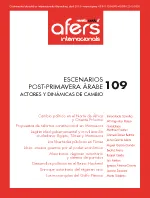Civil liberties in Tunisia following the 2011 uprisings

This article analyses the legislative changes made in relation to civil liberties in Tunisia since the 2011 revolts, specifically, those concerned with freedom of association, expression, and regulation of the media and links them to the socio-political context of the country. The paper intends to demonstrate how social and political factors have produced a new legal framework of action that is based on the new constitution, but which also brings intense regulatory development that in many respects breaks with previous legislation, although certain elements of authority inherited from the past have been preserved. Two aspects deserve special consideration: on the one hand these rules maintain certain limitations as means of social control that are not totally consistent with a developed democracy; and, on the other, problems of interpretation, cultural specificity and authoritarian behaviour mean the lack of liberties in such fundamental areas as those analysed are also preserved.
Key words: civil freedoms, Tunisia, legislation, press laws, laws of association, laws of expression
>> The full text articles of this issue are available only in Spanish language